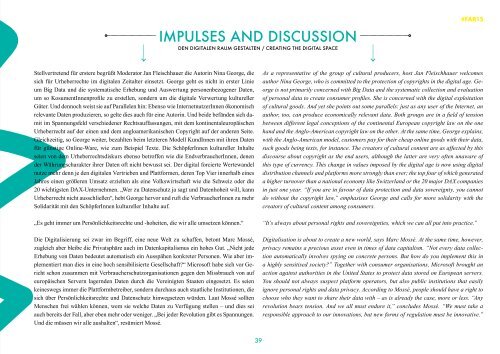DIGITAL IST KULTUR CULTURE IS DIGITAL – DIGITAL IS CULTURE
1n3RpM7
1n3RpM7
Erfolgreiche ePaper selbst erstellen
Machen Sie aus Ihren PDF Publikationen ein blätterbares Flipbook mit unserer einzigartigen Google optimierten e-Paper Software.
IMPULSES AND D<strong>IS</strong>CUSSION<br />
DEN <strong>DIGITAL</strong>EN RAUM GESTALTEN / CREATING THE <strong>DIGITAL</strong> SPACE<br />
Stellvertretend für erstere begrüßt Moderator Jan Fleischhauer die Autorin Nina George, die<br />
sich für Urheberrechte im digitalen Zeitalter einsetzt. George geht es nicht in erster Linie<br />
um Big Data und die systematische Erhebung und Auswertung personenbezogener Daten,<br />
um so KosumentInnenprofile zu erstellen, sondern um die digitale Verwertung kultureller<br />
Güter. Und dennoch weist sie auf Parallelen hin: Ebenso wie InternetnutzerInnen ökonomisch<br />
relevante Daten produzieren, so gelte dies auch für eine Autorin. Und beide befänden sich damit<br />
im Spannungsfeld verschiedener Rechtsauffassungen, mit dem kontinentaleuropäischen<br />
Urheberrecht auf der einen und dem angloamerikanischen Copyright auf der anderen Seite.<br />
Gleichzeitig, so George weiter, bezahlten beim letzteren Modell KundInnen mit ihren Daten<br />
für günstige Online-Ware, wie zum Beispiel Texte. Die SchöpferInnen kultureller Inhalte<br />
seien von dem Urheberrechtsdiskurs ebenso betroffen wie die EndverbraucherInnen, denen<br />
der Währungscharakter ihrer Daten oft nicht bewusst sei. Der digital forcierte Wertewandel<br />
nutze mehr denn je den digitalen Vertrieben und Plattformen, deren Top Vier innerhalb eines<br />
Jahres einen größeren Umsatz erzielten als eine Volkswirtschaft wie die Schweiz oder die<br />
20 wichtigsten DAX-Unternehmen. „Wer zu Datenschutz ja sagt und Datenhoheit will, kann<br />
Urheberrecht nicht ausschließen“, hebt George hervor und ruft die VerbraucherInnen zu mehr<br />
Solidarität mit den SchöpferInnen kultureller Inhalte auf.<br />
„Es geht immer um Persönlichkeitsrechte und -hoheiten, die wir alle umsetzen können.“<br />
Die Digitalisierung sei zwar im Begriff, eine neue Welt zu schaffen, betont Marc Mossé,<br />
zugleich aber bleibe die Privatsphäre auch im Datenkapitalismus ein hohes Gut. „Nicht jede<br />
Erhebung von Daten bedeutet automatisch ein Ausspähen konkreter Personen. Wie aber implementiert<br />
man dies in eine hoch sensibilisierte Gesellschaft?“ Microsoft habe sich vor Gericht<br />
schon zusammen mit Verbraucherschutzorganisationen gegen den Missbrauch von auf<br />
europäischen Servern lagernden Daten durch die Vereinigten Staaten eingesetzt. Es seien<br />
keineswegs immer die Plattformbetreiber, sondern durchaus auch staatliche Institutionen, die<br />
sich über Persönlichkeitsrechte und Datenschutz hinwegsetzen würden. Laut Mossé sollten<br />
Menschen frei wählen können, wem sie welche Daten zu Verfügung stellen <strong>–</strong> und dies sei<br />
auch bereits der Fall, aber eben mehr oder weniger. „Bei jeder Revolution gibt es Spannungen.<br />
Und die müssen wir alle aushalten“, resümiert Mossé.<br />
As a representative of the group of cultural producers, host Jan Fleischhauer welcomes<br />
author Nina George, who is committed to the protection of copyrights in the digital age. George<br />
is not primarily concerned with Big Data and the systematic collection and evaluation<br />
of personal data to create consumer profiles. She is concerned with the digital exploitation<br />
of cultural goods. And yet she points out some parallels: just as any user of the Internet, an<br />
author, too, can produce economically relevant data. Both groups are in a field of tension<br />
between different legal conceptions of the continental European copyright law on the one<br />
hand and the Anglo-American copyright law on the other. At the same time, George explains,<br />
with the Anglo-American model, customers pay for their cheap online goods with their data,<br />
such goods being texts, for instance. The creators of cultural content are as affected by this<br />
discourse about copyright as the end users, although the latter are very often unaware of<br />
this type of currency. This change in values imposed by the digital age is now using digital<br />
distribution channels and platforms more strongly than ever; the top four of which generated<br />
a higher turnover than a national economy like Switzerland or the 20 major DAX companies<br />
in just one year. “If you are in favour of data protection and data sovereignty, you cannot<br />
do without the copyright law,” emphasises George and calls for more solidarity with the<br />
creators of cultural content among consumers.<br />
“It’s always about personal rights and sovereignties, which we can all put into practice.”<br />
Digitalisation is about to create a new world, says Marc Mossé. At the same time, however,<br />
privacy remains a precious asset even in times of data capitalism. “Not every data collection<br />
automatically involves spying on concrete persons. But how do you implement this in<br />
a highly sensitised society?” Together with consumer organisations, Microsoft brought an<br />
action against authorities in the United States to protect data stored on European servers.<br />
You should not always suspect platform operators, but also public institutions that easily<br />
ignore personal rights and data privacy. According to Mossé, people should have a right to<br />
choose who they want to share their data with <strong>–</strong> as is already the case, more or less. “Any<br />
revolution bears tension. And we all must endure it,” concludes Mossé. “We must take a<br />
responsible approach to our innovations, but new forms of regulation must be innovative.”<br />
39


